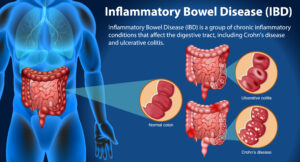
Irritable Bowel Syndrome, commonly known as IBS, is a condition that affects the digestive system, especially the large intestine (colon). It’s a long-term (chronic) issue that can cause discomfort and interfere with your daily life. Though it doesn’t lead to serious diseases like cancer or permanent damage, IBS can be frustrating and emotionally draining due to its recurring symptoms.
If you or someone you know often experiences stomach pain, bloating, or irregular bowel habits like diarrhea or constipation, IBS could be the reason. Let’s understand what it is, what causes it, how to spot the symptoms, and most importantly—how it can be treated effectively.
Understanding IBS in Simple Terms
Think of IBS as a sensitive gut that reacts more than it should to things like food, stress, or hormonal changes. While the exact cause is still not fully known, IBS is often a result of how the brain and gut communicate.
IBS is very common—millions of people worldwide suffer from it, especially those between 20 to 40 years old. It affects both men and women, though women tend to report more severe symptoms.
Common Symptoms of IBS
IBS can look different for everyone, but here are some of the most common symptoms:
- Abdominal Pain or Cramping – This is the most noticeable symptom. It usually gets better after a bowel movement.
- Bloating and Gas – Feeling swollen or full even after a small meal.
- Diarrhea (IBS-D) – Frequent loose stools, sometimes urgent.
- Constipation (IBS-C) – Difficulty passing stools or infrequent bowel movements.
- Alternating Constipation and Diarrhea (IBS-M) – A mix of both symptoms.
- Mucus in Stool – Some people notice white or clear mucus with bowel movements.
These symptoms may come and go. Some days may feel normal, while other days can be painful or uncomfortable.
Causes and Triggers of IBS
Doctors don’t know exactly what causes IBS, but several factors can trigger or worsen the condition:
1. Stress
Your gut and brain are closely connected (called the gut-brain axis). Emotional stress, anxiety, or trauma can affect how your digestive system works.
2. Food Sensitivities
Certain foods can act as triggers. Common examples include:
- Spicy food
- Dairy products
- Fried and fatty foods
- Artificial sweeteners
- Caffeine and alcohol
3. Hormonal Changes
Women often find that their IBS symptoms worsen during their periods due to hormonal shifts.
4. Infections or Gut Imbalance
Some people develop IBS after a bad stomach infection (post-infectious IBS). Others may have an imbalance of good and bad bacteria in the gut (dysbiosis).
How is IBS Diagnosed?
There’s no specific test for IBS. Doctors usually diagnose it by:
- Listening to your symptoms
- Ruling out other issues like infections, celiac disease, or inflammatory bowel disease
- Sometimes asking for stool tests, blood tests, or a colonoscopy to make sure there’s nothing more serious
If your symptoms have lasted more than 3 months and are affecting your life, it’s time to speak to a specialist.
You can consult one of the top 10 gastroenterologist in Surat to get the right diagnosis and a personalized treatment plan.
Treatment Options for IBS
The good news is—IBS can be managed successfully, even though it has no permanent cure. Treatment depends on your symptoms and what triggers them.
1. Diet Changes
Your doctor may recommend:
- Low FODMAP Diet – This diet avoids certain sugars and carbs that ferment in your gut and cause gas and bloating.
- High-Fiber Foods – Helps with constipation but needs to be added slowly.
- Avoiding Trigger Foods – Like dairy, caffeine, spicy foods, or fried snacks.
2. Lifestyle Changes
- Regular Exercise – Helps improve digestion and manage stress.
- Stay Hydrated – Drink plenty of water, especially if you have constipation.
- Sleep Well – A good sleep cycle supports gut health.
- Manage Stress – Yoga, meditation, or talking to a therapist can reduce symptoms.
3. Medications
Depending on your symptoms, doctors may suggest:
- Antispasmodics – Reduce stomach cramps.
- Laxatives – For constipation relief.
- Anti-diarrheal meds – For diarrhea control.
- Probiotics – To support gut-friendly bacteria.
- Antidepressants – Sometimes used for severe pain or stress-related IBS.
When to See a Doctor
While IBS isn’t life-threatening, it can make life uncomfortable. Talk to a doctor if:
- You have constant abdominal pain
- Your symptoms don’t go away or worsen
- You notice blood in your stool
- You lose weight without trying
- You feel anxious or depressed due to gut issues
Early diagnosis and the right treatment plan can make a huge difference.
Living with IBS: Final Thoughts
IBS may be a part of your life, but it doesn’t have to control it. With the right diet, lifestyle, and medical support, you can reduce flare-ups and improve your quality of life. Remember—everyone’s IBS is different, so personalized care is key.
If you live in or near Surat, seeking guidance from one of the top 10 gastroenterologist in Surat can give you clarity, comfort, and confidence in your digestive health journey.
